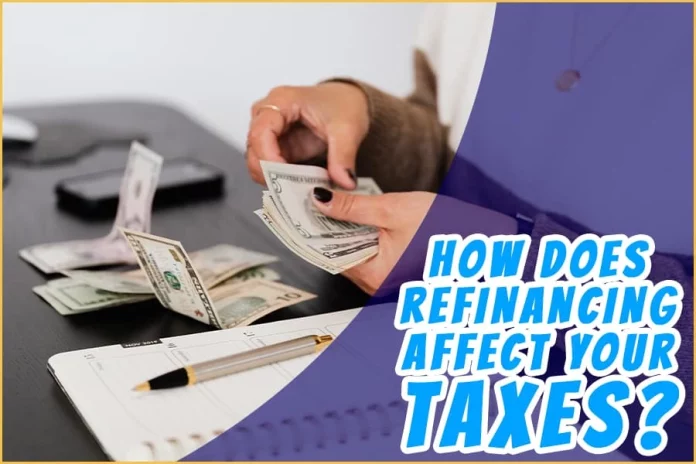Property ownership is complicated in many countries. Most folks can’t afford to purchase property outrightly, but it is easier to make periodic payments.
Countries with developed financial structures and secure financial institutions facilitate purchasing property. Most people acquire real estate through mortgage financing.
In making payments on your property, you might want to change the terms of your periodical payments.
It could be due to the interest rate being affected by the inflation rate, changes in real income, seeking favorable terms, etc.
Changing the adjustable rate is called refinancing. It is an agreement between the mortgagor and the mortgagee to restructure the repayment terms.
The arrangement has implications for your property tax.
So, How Does Refinancing Affect Your Taxes?
You can lower your statutory deductions if you itemize the deductions. You categorize some deductions as tax allowable rather than filing for a standard deduction. You can claim the total tax allowable deductions from the revenue authorities.
Reasons For Refinancing
There are several reasons why people opt into restructuring agreements. Most of the time, it has to do with varying or prolonging the repayment period or changing the adjustable mortgage rate.
Refinancing agreements are mutual consensus contracts between the lender and borrower. These agreements are at times necessary for the benefit of both parties.
Here are some compelling reasons for refinancing.
1. Changes in the inflation rate
Like in most lending agreements in the real estate market, the adjustable rate of returns for the lending institution moves in tandem with prevailing inflation rates.
If the inflation rate increases, so do the interest repayment rate. You can seek to refinance to prolong the repayment period if the lender ascertains that you are financially capable of making payments. They determine your financial position by accessing your default risk.
If the inflation rate reduces to a fair amount, you may restructure the payments to keep making payments at a higher interest rate.
The implication is that you have a shorter repayment period. It might be risky, and the lender would need to reassess your default risk.
2. Changes in real income
A mortgagor might seek to change the contractual terms of payment if their real income changes. Real income is pegged to the real value of your earnings rather than the nominal value. Real income is the value of money adjusted for inflation.
If your real income increases, you might opt for a shorter repayment period. It means that the lender will increase the effective rate, and you will therefore complete your payment in a shorter time.
You may, however, incur a penalty if you shorten the repayment period, depending on your initial contract.
If the real value of your income reduces, and you are lucky enough to get a refinance agreement, your interest rate will reduce, and the repayment period will be extended, with a penalty. The financial institution will have to reassess your default risk.
3. Circumvent mortgage insurance
If you have poor credit or don’t have liquid assets, you can still acquire property through government insurance.
The Federal Housing Administration issues loans to prospective homeowners, provided they take up compulsory insurance on their mortgage.
The mortgage requires that you pay a 1.75 percent premium initially and continue incurring an additional 0.85% premium on your property value annually.
How then can you eliminate the insurance premiums? You will need to continue making periodic payments until you reach the 20% value of the property.
At this point, you can convert the Federal Housing Administration loan into a standard mortgage, effectively ending the initial premium payments.
4. Seeking Favorable Terms
Depending on the lender, you can seek favorable repayment terms. The lender might sign on a lower rate and extended period payments provided you have a low default risk on the property and that the institution can understand your financial reasons.
Lowering the effective interest rate has implications. It prolongs the repayment period, but you will also incur a penalty.
What Qualifies As Tax Deductible?
You need to make certain compulsory statutory and non-statutory payments regardless of refinancing. These payments are:
Home equity
According to the 2018 tax plan, you must pay home equity. Before 2018, it was tax allowable except for renovations and improvements.
Property taxes
You will still pay taxes on your property before the refinancing date, but you should make adjustments in the new financial year.
Home Owners Insurance
You must continue to pay insurance if you own a private residence. The payments, in this case, are compulsory regardless of refinancing.
Points
Discount points must incur tax. You could only make deductions if the points were not amortized before the refit period.
Types Of Refinancing
The mortgagor and the mortgagee can reach several types of refinancing agreements. These agreements are:
1. Cash-out refinancing
Cash-out refinancing involves the lender retiring the old mortgage and issuing a new one whose value is greater than the old mortgage.
Under cash-out financing, the borrower receives the difference between the new and old mortgage in cash.
The implication is that the mortgagee will pay a more considerable sum for the property than its initial value.
The interest amounts rise upon cash-out refinancing. The agreement allows the mortgagee to receive cash which is beneficial in the short term.
Refinancing through a cash-out agreement comes with a higher default risk if the borrower cannot keep up with the higher interest rates.
2. Cash-in refinancing
Cash in refinancing is standard when the mortgagee comes into a sizable sum of money. The agreement is that the borrower puts down a huge lump sum in relation to the property value.
Many financial institutions perceive these mortgagees as less risky borrowers. Due to their seemingly low default risk, you are likely to get favorable terms for your repayment options, either through reduced rates on the adjustable rates or a more extended repayment period.
Opting into a cash-in refinance agreement might reposition your loan to a fixed rate, depending on the contract agreement.
3. Rate and term refinancing
A rate and term agreement is a unique arrangement where the overall repayment value on the property remains constant. The repayment duration changes, and so does the interest rate.
The unique agreement allows you to pay a higher interest rate if you wish to complete your repayment sooner.
The arrangement is ideal because you do not incur further expenses on the final value through penalties or fines.
You can opt for a reduced rate and a more extended payment period in rate and term finance. The agreement is dependent on the goodwill of the lender and is usually advanced to borrowers with low default risk.
4. Consolidation refinancing
Consolidated refinancing is a unique arrangement where a borrower takes on new debt to complete an old loan’s principal and interest payments.
Consolidated refinancing involves taking out a consolidation loan. A consolidated loan may help you secure a cash-in agreement, which is beneficial in the long term to the borrower. You can begin making payments on the consolidated loan, just as you did with the mortgage.
Upsides Of Refinancing
There are several advantages to taking on refinancing. They include:
Reduced taxes
You can claim to tax allowable deductions from the revenue authority if you decide to itemize the deduction. You will not access the deductions if you file as a standard deduction.
Favorable repayment terms
You will access many favorable options through rate and term refinancing without incurring fines and penalties.
Shorter repayment periods
You can shorten the interest payment period through cash-in and rate-and-term refinancing, meaning you can own your home sooner.
Access to cash
You can access liquid cash instantly through a cash-out agreement. The mortgagor will pay you the difference between the old and new rates in cash.
Downsides Of Refinancing
Refinancing comes with some disadvantages, which include:
1. Higher interest payments
If you decide to lower the loan repayment period, you will have to pay higher periodic payments, which might increase your default risk.
2. Long-term disincentives
Under cash-out agreements, you will pay more money in the long run for a property whose value might not increase.
3. Forgoing lower rates on adjustable interest rates
If you refinance to a fixed rate, you will forgo the benefits of paying lower periodic payments in favorable economic periods.
Conclusion
In most developed countries, people opt to own property by periodically paying a fixed and adjustable-rate—financial institutions such as banks, building societies, mutual funds, etc.
Countries with secure financial institutions have the most significant proportion of mortgage properties. You can agree with the financial institutions to change the repayment structure.
There are several reasons why it might be best for both parties to reach a new repayment agreement. Once you itemize your statutory deductions, you can claim certain tax allowable deductions.












